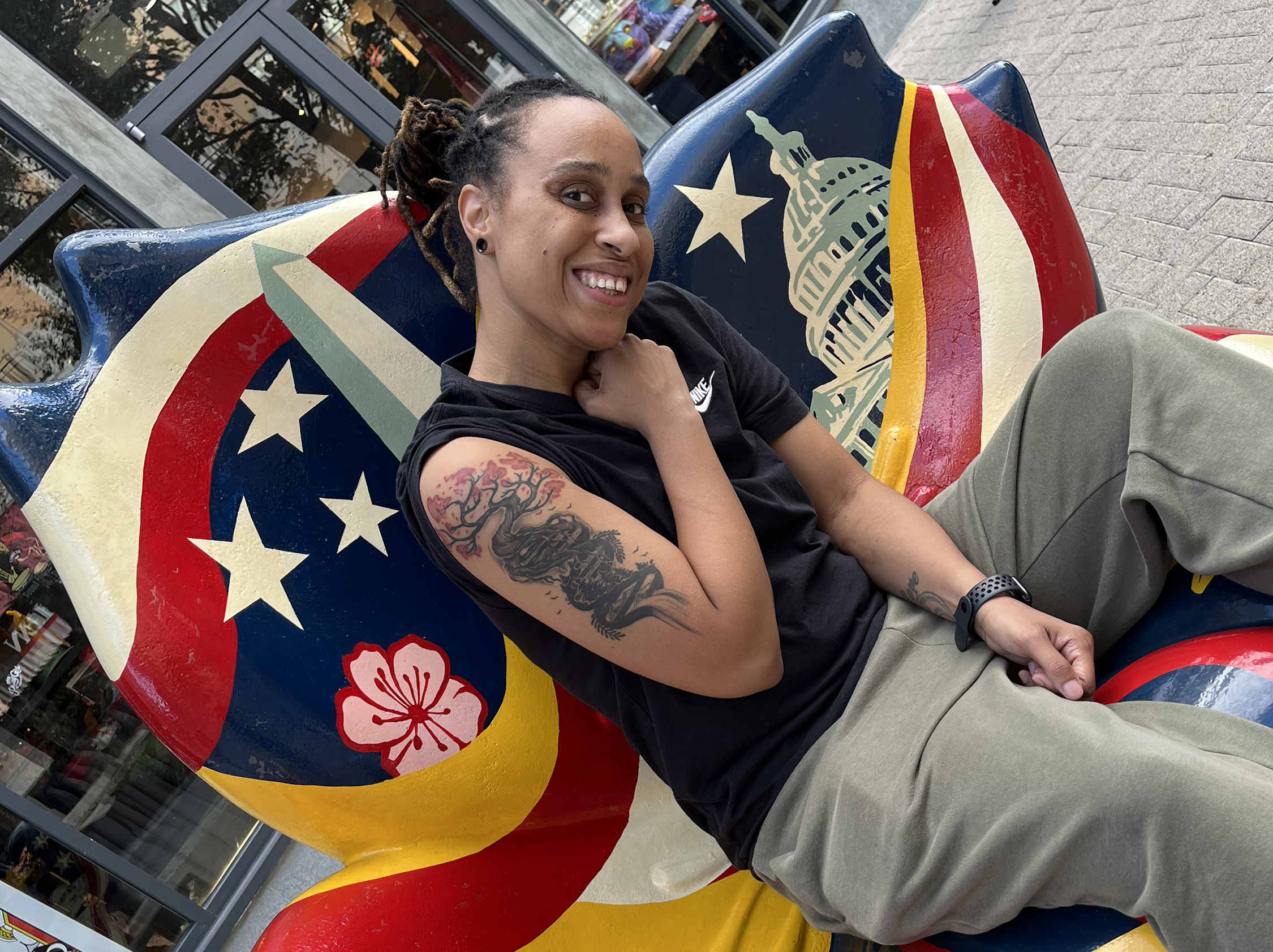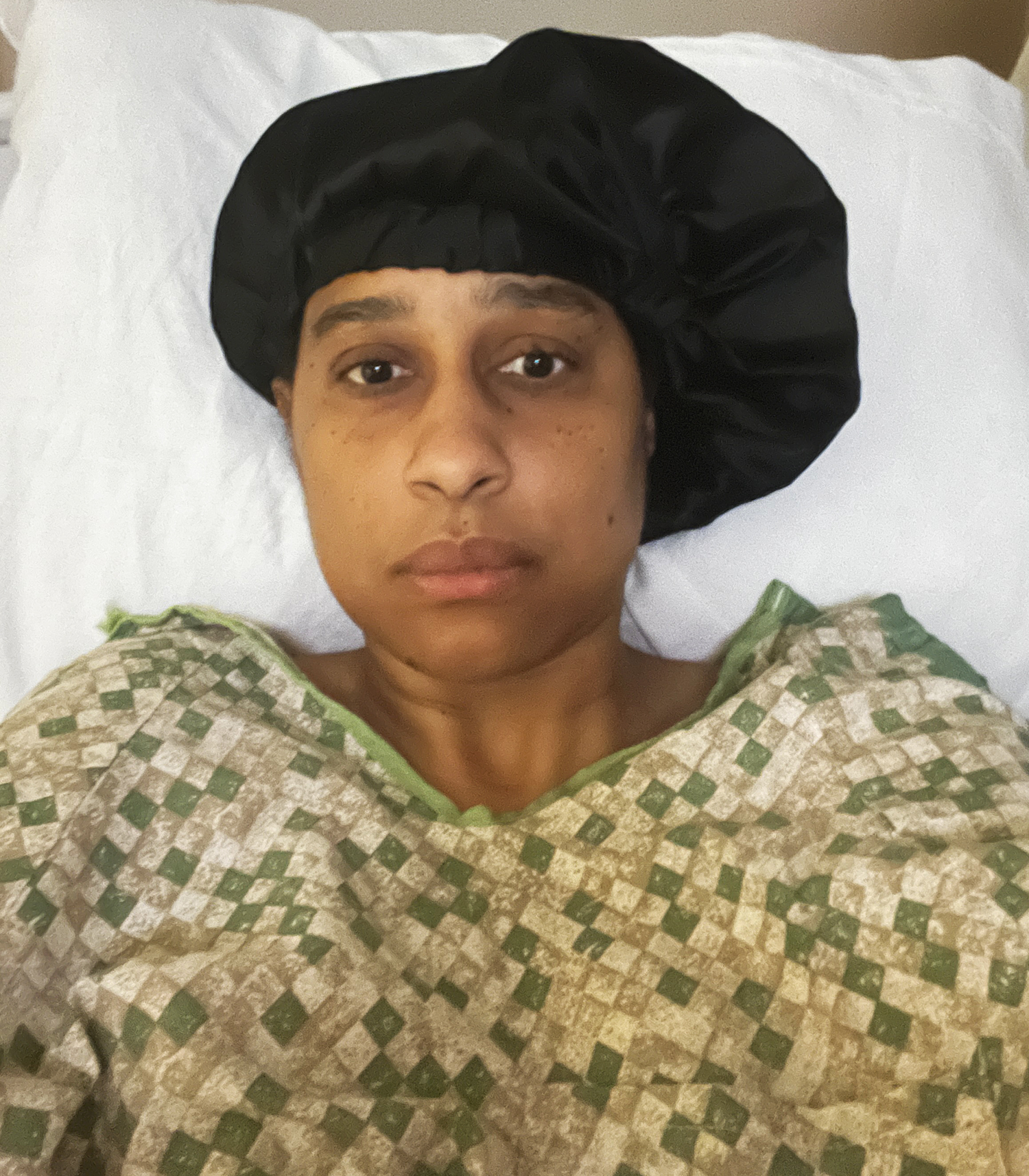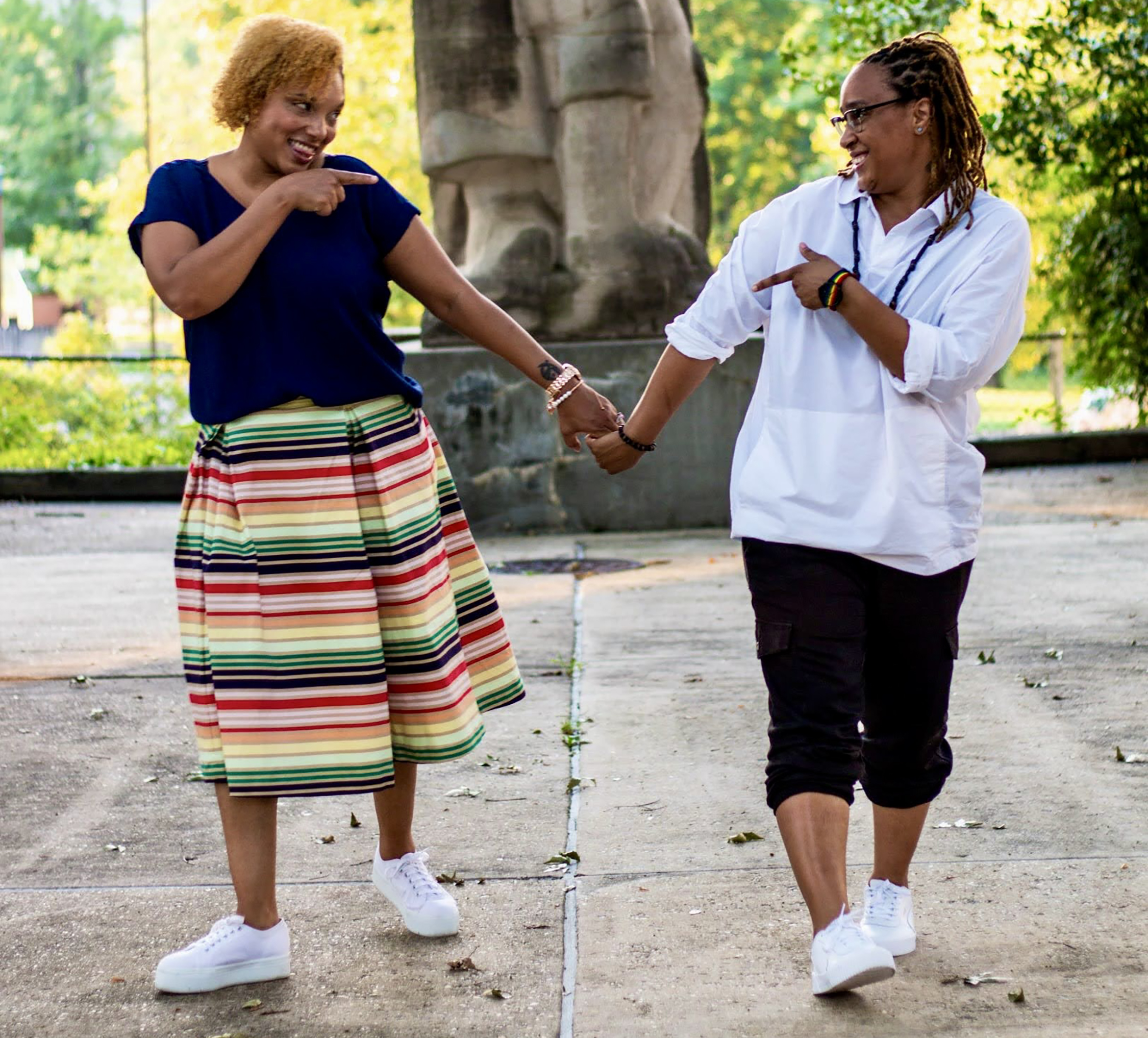
By JaDonna Harris
Trinity Times Correspondent
I turned 40 June 27, 2023, and while I had no expectations for what my 40th year would be – nor resolved on any accomplishment by that milestone – I was going to allow this new decade to show me whatever I needed to learn and to help me get me to the next stage of my life.
I wasn’t, however, expecting a malady to reveal the inadequacies in our healthcare system and change the course of journey in this life.
I was comfortable as I approached my 40th birthday.
My family and I were happy, bills were getting paid, my wife and I were going on dates, and our daughter was thriving in school and socially.
I had no reason to believe that this new year of life – that I welcomed with opened arms – would change my existence so much.
Let me give a little back story before I jump into the details of my life-changing event.
For two years, I have been suffering with a pain on my right abdomen. This pain began after I had my appendix removed three years before.
I noticed the pain a few days after getting my second vaccination for COVID-19.
I went to the emergency room complaining of the right-side pain and after undergoing a CT (computed tomography) scan, without contrast, I was told that I had Urinary Tract Infection (UTI).
The doctors in the ER discharged me with a prescription for antibiotics for the UTI and advised me to follow up with my primary care physician (PCP).
I followed up with my PCP six months later and my doctor — a white man, did not acknowledge the existence of my pain, making me feel as though it was psychosomatic.
Within a month the pain went from being an occasional ache to a more frequent pain, so I went to see a new PCP, this time a woman. By this time, it is January 2022, and the pain begins every month – a week before my monthly cycle.
My new doctor requested blood work, including Lipase test. This test is used to check for diseases of the pancreas. That blood work came back normal.
At that point I was beginning to feel defeated. I started thinking that maybe it was in my head. What do you do when your doctors are telling you everything is fine, and all the tests are coming back normal? You go on living your life as usual, and that is exactly what I did.
I went through my normal routines, worked out, went to work, continued my studies at Trinity Washington University, and spent time with family.
In March of 2023, while washing the dishes, I begin to feel dizzy, and I heard a ringing in my ears. I walked out of the kitchen to the dining room and grabbed hold of one of the dining room chairs, as I told my wife I was feeling dizzy.
What I remember next is waking up with my head on the kitchen floor and the sound of my wife’s voice on the phone with 911 telling them that I fainted. The paramedics came and said my blood pressure was high and suggested I go to the Emergency Room.
When I got to the ER, my wife and I explained what happened at home and I explained that this pain in my right abdomen was back. The doctors gave me an EKG (electrocardiogram) and requested more blood work.

Both my heart rate and blood pressure were high and now my Iron levels were extremely low. The ER doctors diagnosed me with a syncopal episode – which happens when you have a sudden, temporary drop in the amount of blood that flows to your brain – and they determined that was because of my low Iron. However, none of my blood work in past showed any indication of low Iron, now all sudden I am Anemic. I was so confused.
I followed up with new PCP – this time a Black woman around the same age as me – a few days after leaving the ER. She also was under the impression that I fainted because of the low iron. She requested more blood work, placed me on iron pills, and sent me to get a pelvic ultrasound to see if I had any cysts or fibroids, which would be an explanation of the abdominal pain I was experiencing.
The ultrasound came back normal, no cysts and no fibroids, and the ultrasound tech told me I had a cute uterus.
Here I was again, with no explanation of this pain and no real explanation as to why I now am Anemic and need to take iron pills.
I decided to go along with it because I placed my trust in my doctors, and no one seemed to be worried about this long-standing pain that I was experiencing.
I just kept thinking maybe it was all in my head.
However, the pain became more frequent. Now I was in pain daily.
The pain will go between a six and eight on a scale of 10 throughout the days.
In June, close to my 40th birthday, in addition to the pain, I noticed a tightness in my lower right abdomen. I felt something forming inside of me. I started to become uncomfortable. I could not sleep on either side because it was too painful.
My wife could not cuddle with me because it was too painful.
I had scheduled a physical with my doctor for August, so I decided I would wait to address this until that appointment.
However, on Friday, Aug. 11,2023, I woke up, prepared to go to work, but my pain had escalated to a 10 out of 10 and I was having difficulty standing up.
I immediately woke my wife and told her I needed to go to the ER because pain was unbearable. The ER doctor on staff that morning was a pregnant woman, who listened to me and said she was going to order a CT scan.
This time the CT scan was done with contrast, and it showed a mass that was approximately 8 cm in the cecum of my colon.
The doctor came in the room and sat in the chair, which is never a good sign, and explained that there was a mass, and she could not say for sure if it was cancer, but it needed to be removed as soon as possible. She told me to follow up with my PCP immediately, and she gave me referrals to a Bariatric surgeon and an Oncologist.
As she was telling me this, I was trying to digest the information. That I have a mass that is possibly cancer, and it needs to come out right away. I was struck with fear. I knew that “Black Panther” star Chadwick Boseman died of colorectal cancer at the age of 43 and I was only 40, and not as physically fit as he was. I knew I didn’t not eat as healthy as I should.
I kept wondering if this was also going to take my life.
What I decided to do with this information was look at the facts and not the what ifs, a lesson I had been putting in practice thanks to two years being in therapy and working on my mental health.
Whenever my mind began to run with the doom and gloom of what this could possibly do to me, I had to make the conscious decision to say no and ask, “what are the facts?” It was not easy, but it was necessary.
As my wife and I left the ER, I called the surgeon, a woman, who scheduled to see me on Wednesday, Aug. 17. I then reached out to my PCP and explained what happened in the ER and she scheduled to meet me on Tuesday, Aug. 15. I am listing the dates to show how quickly events moved from the ER to present day in October 2023.
My PCP was so shocked to learn about the mass but was grateful I had gone to the ER and that I was moving ahead to make the necessary appointments to get this mass removed. She provided me the name and number of an Oncologist, whom I was able to schedule an appointment with the following week, Aug. 23.
I met with the surgeon next, who showed me the CT scan of the mass, as I sat with my mother and my wife. Immediately we all became worried because it was huge.
However, I also felt a sense of relief because I knew that I was feeling something and that it was not all in my head.
At this point we still were not calling it cancer, so I gave it a name, Malcolm the Mass.
The surgeon said that I needed to get a colonoscopy so they can do a biopsy of Malcolm to determine what it was so she can be certain about the removal process.
She knew that it would be difficult to schedule an appointment with a gastroenterologist, so while we are discussing the procedure, the surgeon sent a message to a GI doctor she had worked with previously and explained my situation. The GI doctor agreed to see me the following day.
I met the GI doctor, another woman, who met me on her lunch break, and explained the seriousness of getting this mass out as soon as possible. She then scheduled me to get a colonoscopy and biopsy on the following Monday, Aug. 21.
After the colonoscopy was completed the GI doctor came to me in the recovery room and said that she could not say for sure if it was cancer until the biopsy came back, but said it did not look good, and that I needed to reach out to all my siblings and tell them to get colonoscopies as soon as they can.
My head was just swimming, and it was it was a little difficult to tell my mind to stop. I believe part of it was also because I still had the anesthesia in my system.
As the nurses moved me from the bed to a chair to discuss my next steps and to show me the pictures of the mass, the worry on their faces made me worry and I felt the tears run down my cheeks.
It was at this point when the realization set in that Malcolm was more than a mass, and that he could in fact be deadly.
They called my wife back to the recovery area. She comforted me and helped me get dressed. The nurses provided me with calming words and prayer.
Within a few hours after the colonoscopy was completed, I received a call from the surgeon’s office telling me she was scheduling my surgery Sept. 5 to remove Malcolm, which would include removing the entire right side of my colon, also known as the ascending colon.
I was amazed and nervous by how quickly everything was moving. In fact, it was moving so fast that I did not have time to process any of it in the moment.
Two days later I had my consultation with the Oncologist, another woman, who had seen the scan and the pictures from my colonoscopy, and she said, that in her opinion it was cancer, and if I could get it removed quickly, I should not have to endure Chemotherapy, as long as there were no masses anywhere else.
So, she referred me to get a full chest scan, abdomen scan, pelvic scan, and a mammogram.
I scheduled the scans for later in the week and the mammogram was scheduled right before the surgery. I am still in awe how everything worked so well together.
CT scans, although quick, are not fun. The medicine they give you tastes like metal; it warms your body and makes you feel as if you used the bathroom on yourself.
Thankfully, all my scans and mammogram came back “unremarkable,” which is used to say that everything is normal.
I had my follow up appointment with the GI doctor a few days later, so she could give me the results of the biopsy.
I listened as she said the results came back as precancerous but not cancer. She asked me when I was having the surgery, and I told her Sept. 5. That pleased her.
I remember the Oncologist saying that because the biopsy is done from the outer layer of the mass, there could be no true diagnosis until the mass was removed, opened, and tested.
Even though the biopsy did not say cancer, I did not get my hopes up about the negative cancer result from the biopsy.
Leading up to the surgery and through all the appointments, Malcolm became angry and stayed at a level 10 pain, so I was prescribed narcotics to help with the agony.
I was unable to return to work, I had to take a leave of absence from my studies at Trinity, but I was not depressed. I was able to appreciate that I was alive, that I was valid in my feelings, and that Malcolm would soon be removed from my body.
I was told by surgeon that once the surgery was completed that I would be on a liquid diet for a few weeks to make sure that everything was working properly. Because of that, and because my family was worried about me, I decided to have a dinner at my favorite crab house and invite all my family the Friday before my surgery. I was able to enjoy my final solid meal for a while and to commune together before my surgery. We had a great time. Everyone showed up for me.
The morning of my surgery I woke up anxious but hopeful. My surgery was originally supposed to be 2 to 3 hours but ended being 4 hours due to a few complications.
I was thankful to open my eyes when I woke from the surgery. They took me to my room because I had to stay overnight, and wife and my paternal grandmother were there waiting for me. I was grateful to see them.

I was released from the hospital the next day and followed up with the surgeon the following week. I was healing well, I did not need the pain meds as often, the liquid diet was doing what needed to be done and I was advised that I could return to my regular diet.
The results after Malcolm’s removal came back by that follow up visit and it was indeed cancer. Stage two colon cancer.
If Malcolm would have stayed inside of me any longer it could have quickly moved to stage three and the cancer could have spread to my lungs or my kidneys, but God placed the right team of woman around me who saw the urgency and moved accordingly.
As I am recovering, I am researching colon cancer and I see how many Black men and women under 50 have died from colon cancer.
I learned that after Chadwick Bosman died, the age where a person is typically eligible for a colonoscopy was reduced from 50 to 45. A colonoscopy is the best way to diagnosis colon cancer, but if you are not old enough to get one your doctor typically would not refer you for one.
Bosman passed at the age of 43. He still was not old enough to get a colonoscopy.
I technically was not at the age where I typically qualified for it either. It was only because I was persistent and went back to the ER that I was granted a colonoscopy.
My siblings who are under the age of 45 are having trouble scheduling their colonoscopies, even after having a sibling with shared parents with the diagnosis.
I strongly believe this needs to be changed. The medical industry and the insurance companies must do better. If I would have waited until I was 45, I may not be here today.
A 2019 study published in the American Journal of Emergency Medicine found that Black patients were 40% less likely to receive medication for pain, compared to white patients.
Multiple studies have also found that Black women are less likely to be taken seriously about their pain than white patients.
I will follow up with my Oncologist soon and I will know what my next steps are. I am hoping that Chemotherapy is not needed. I know I will probably get scans every so often and that I must get another colonoscopy next year.
Until then, I am staying positive and hopeful. I am grateful to be here to tell my story and I hope my experience helps someone else.
I am grateful that I did not wait until I was 45 until I received my colonoscopy. I am looking forward to enjoying the rest of 40th year.
Im reading this with tears. Our health system have to do better because many wont be as persistent as JaDonna and will accept no for an answer. May GOD continue to bless JaDonna and her family.
Thank you for this story. I teach first year nursing students and frequently talk about healthcare inequity and disparity. Using JaDonna’s story drives the essential need for patient advocacy that is imperative to minimize some of the disparity in treatment we see.